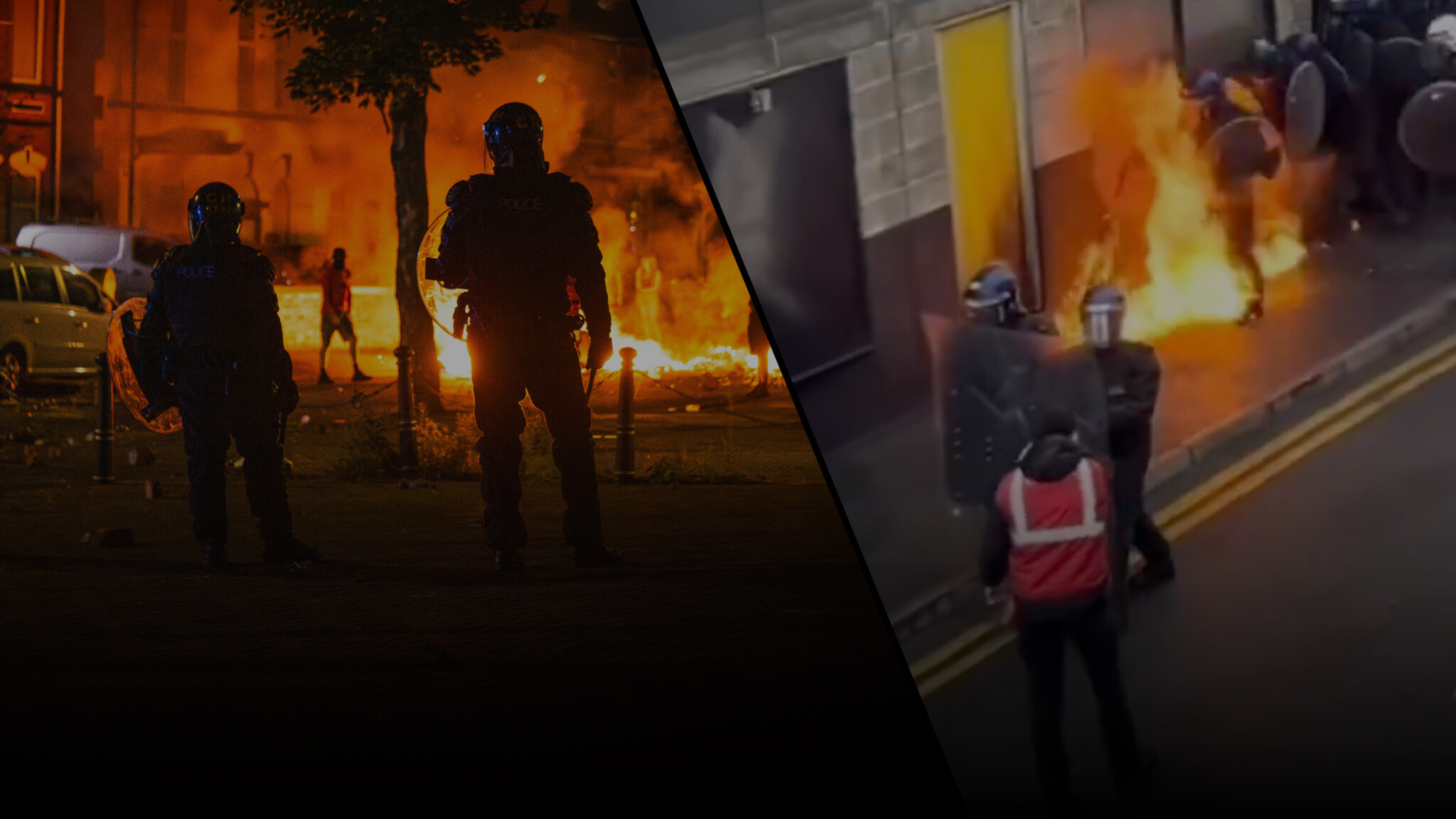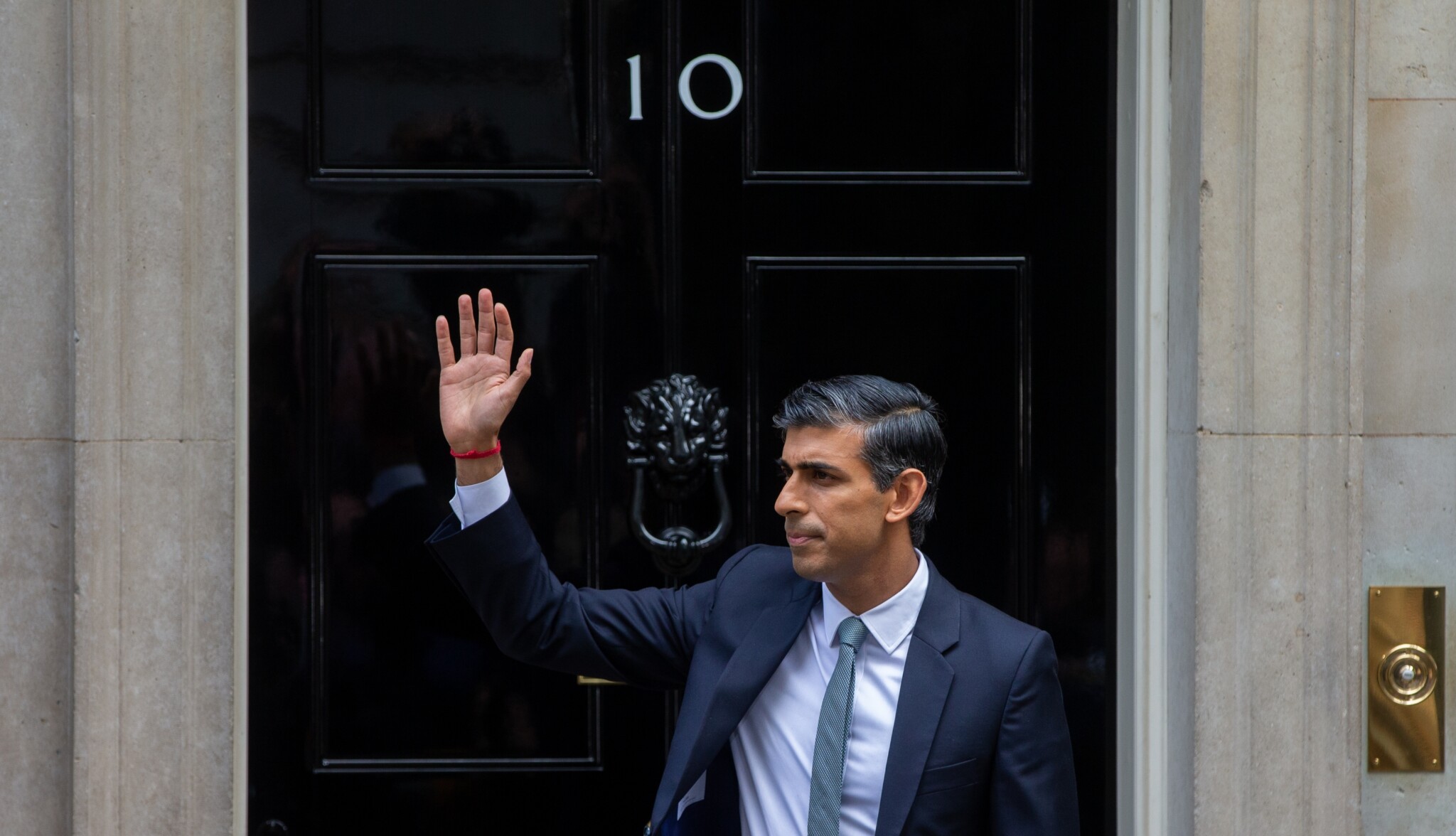
Britain’s police aren’t training to stop riots—they’re preparing to crush the public.
One of the infamous quotes from George Orwell’s Nineteen Eighty-Four is, “If you want a picture of the future, imagine a boot stamping on a human face— forever.” He forgot to add, “on TikTok”. Last Thursday, the Metropolitan Police posted a montage of officers at the Metropolitan Police Specialist Training Centre in Kent, undergoing riot training. The caption read, “Bricks, bottles and fire bombs – our officers prepare for every eventuality at the Met’s elite training centre in Gravesend so they can keep you safe. Stronger tactics means safer communities.” It seems they had one specific “eventuality” in mind, as the mock rioters were wearing the Union flag. There wasn’t a keffiyeh or “Only good TERF is a dead TERF” sign in sight.
🚨NEW: Footage has surfaced of MET riot police training in London
— GB Politics (@GBPolitcs) April 24, 2025
It features a man wearing a British flag on his arm and a cross on his back pic.twitter.com/ebzgNnIsua
But fear not. The same Met Police who defended now-proscribed group Hizb ut-Tahrir’s demonstration after October 7th, saying “The word jihad has a number of meanings”, now insist that “The fact one of the t-shirts has a union flag on it is entirely coincidental.” Well, that’s me convinced. In fact, the Met are exhausted by your conspiracy theories, writing that “It’s disappointing we are increasingly having to challenge this sort of misinformation which only serves to increase divisions and tensions.” But the plummeting public trust in Britain’s police and justice system are of its own making. Britain’s security state is setting itself in opposition to the largely law-abiding indigenous host majority, while gaslighting them about the non-existence of a two-tier justice system that favors tribal minorities.
One might think, as Sam Bidwell suggests, the police should preoccupy themselves with preventing street conflicts not between Britain’s indigenous host and immigrant populations, but between its Indian diaspora and Pakistani enclaves. On April 22, Pakistani Islamist group Lashkar-e-Taiba killed 26 and injured 20 more in Indian-controlled Kashmir. Both nations cancelled the other’s visas, and are in the process of expelling foreign nationals before they expire. Pakistan has suspended all trade with and air travel from India. Hindu nationalist Prime Minister Modi has warned, “India will identify, track and punish every terrorist, their handlers and their backers, [and] we will pursue them to the ends of the earth.”
Thanks to decades of mass immigration and multiculturalism, Britain is home to powerful Indian and Pakistani ethno-political lobbies. Around 3 million Indians and 1.9 million Pakistanis live legally in the UK. They are substantially younger than the white British host population, and already brought Leicester to an ungovernable standstill in 2022 when Muslims and Hindus rioted for a month over a cricket match. Last Friday, both factions gathered outside the Pakistani Embassy in London for a mixture of a protest and a dance-off, replete with Indian, Pakistani, Israeli, and Palestinian flags. Most alarming was when Colonel Taimur Rahat of the Pakistani military appeared to make a throat-slitting gesture toward Indian protestors.
Both subcontinental factions have sympathetic politicians. They weaponize domestic antidiscrimination law to pursue foreign policy goals: for example, listing the denial of an independent Palestine and Kashmir as an example of Islamophobia, in guidance adopted by local councils. Conservative-party candidates committed to a Hindu Manifesto at the last general election, promising to further liberalize visa rules for dependents and elderly parents of Hindus already in Britain. Indian-heritage cabinet ministers, like Priti Patel and Rishi Sunak, instigated an unprecedented rise in Indian migration after Brexit. Patel described these migrants as “living bridges”, using Prime Minister Modi’s term.

Diaspora politicians, backed by Rishi Sunak and others, use UK anti-discrimination law to push pro-Kashmir and pro-India agendas against public interest.
Meanwhile, Labour MP Tahir Ali led a letter-writing initiative to lobby the British government to build an international airport in Mirpur — the region from where a majority of Pakistani rape-gang perpetrators come. Ali spoke alongside independent Gaza-obsessed MP, Ayoub Khan at a Pakistani community event in Birmingham, to demand the airport be built while uncollected rubbish continues to pile up in their constituencies. In an act of shameless ethno-religious solidarity, Khan dismissed the rape gangs scandal as a “false right-wing narrative […] done in order to sow division” during the event. Tahir Ali said nothing, and has not commented since receiving criticism for his silence. It is clear that Labour feel pressure to pander to ethno-sectarian interests to keep Pakistani voters on the plantation, or lose them to a breakaway Muslim vote. Hence their repeated attempts to prevent a national inquiry into the Pakistani rape gangs, and why the likes of Scottish Labour Leader, Anas Sarwar encourage Pakistanis to use the Labour party as the vehicle to enter British politics and push for ethno-religious sectarian interests.
In any case, an India / Pakistan war has the potential to split Britain’s state in two, and engulf its streets in sectarian violence. But none of this concerns the white British majority — who would be barricaded in their homes while tribal minorities, whom they voted against importing in every election since 1974, do battle. So why are the Met Police training to fight rioters wearing British flags?
After Axel Rudakubana murdered three girls and wounded ten others at a Taylor Swift dance class in Southport, protests erupted in largely Labour-controlled constituencies. Communist agitators like HOPE Not Hate blamed defunct “far right” groups like the English Defence League for inciting the violence. This became the consensus view of politicians: with Keir Starmer saying, “I won’t shy away from calling it what it is – far-right thuggery”, and that “A mindless minority of thugs – who thought they could get away with causing chaos … Under the pretence – and it is a pretence – of legitimate protest.” This was despite the BBC admitting that “no one organisation owned or organised the riots” and that disaggregated anger drove the spontaneous civil unrest. But it provided a convenient pretext for the state to censor social media, and mobilize magistrates courts around-the-clock to convict demonstrators for racially aggravated public-order offences. Justice minister James Timpson told the Guardian in March that additional prison places have now been created “for the capacity that would be needed if we had the riots, the civil disobedience, [we saw] in the summer”. Some of these were created by the early release of 2,800 violent offenders to “ease overcrowding”. The narrative that emerged depicted the British public as so febrile that they might be manipulated by online misinformation into attacking ethnic minorities at random. This has set the security state in anticipatory opposition to the host majority, as the protectors of beleaguered minorities.
This well-founded assumption that the police are not on the side of the British public led to claims of two-tier policing, two-tier justice, and the nickname Two-Tier Kier. Two-tier policing has been de facto in Britain ever since the Metropolitan Police were accused of “institutional racism”, and decided to record the thoughts, remarks, and social-media posts by members of the public as non-crime hate incidents to beat the allegations. Police were discouraged by the College of Policing’s Hate Crimes Operational Guidance (2014) from engaging in “secondary victimisation” by asking anyone reporting a perception-based “hate incident” for evidence. By virtue of being offended, someone with a “protected characteristic” — a minority ethnic, religious, gender, or sexual identity — is a victim, on whose behalf the truncheon of the state will be wielded. The end result is the police recording 13,000 non-crime hate incidents a year (133,000 since 2014), and arresting 12,000 people each year (33 per day) for social-media posts. Most are for perceived racist comments; meaning the state is running a protection racket for the reputations of imported minority groups.
It was almost de jure in April, when new guidance by the Sentencing Council instructed judges to give less punitive sentences to women, members of “an ethnic minority, cultural minority, and/or faith minority community”, and transgender people. Justice Secretary Shabana Mahmood sat on her hands until the eleventh hour, because she agreed ideologically with creating an oppression pyramid in Britain’s legal system, but couldn’t handle the bad press. After all, the guidance was based on recommendations in the Lammy Review of racial disparities in the justice system, authored eponymously by her Cabinet colleague, the Foreign Secretary. Mahmood’s representative was present at the Sentencing Council meetings where the guidance was proposed, and raised no objections. Mahmood’s own department, the Ministry of Justice, have also produced guidance ahead of a government bill on pre-sentencing reports, which instructs magistrates to account for offenders’ cultural background and whether they have suffered “intergenerational trauma” from “important historical events”, like colonialism or slavery. The intent of Britain’s institutions is to implement an apartheid system which penalizes the white host majority to pursue equity and protect the feelings of imported ethnocentric minorities.
So isn’t it reassuring that the Home Affairs Committee in Parliament has released a report, investigating and acquitting themselves of any “Unsubstantiated and ‘disgraceful’ claims of ‘two-tier policing’”? It stated the police’s response to the protests following the murder of three girls in Southport was “entirely appropriate”.
The Home Affairs Committee found no evidence for these claims. It considers the police response to be entirely appropriate given the levels of violence and criminality.
It additionally expresses disappointment at the unsubstantiated claims of ‘two-tier policing’ through social and traditional media. Such claims undermined the efforts of police officers dealing with the riots.
The report “commend[s] the bravery and professionalism of those officers who worked for long hours in extremely difficult circumstances,” despite the egregious disparity in convictions between demonstrators last summer (93) and rape gang perpetrators (68) in Rotherham. There is also a disparity in sentences: as mentioned in a previous piece on Courage Media, Lucy Connelly, the traumatised wife of a Conservative councillor, was sentenced for 31 months in prison for an incendiary tweet after the Southport murders, whereas Bannaras Hussain, convicted drug dealer and serial child rapist, was released last December after only 9 years of his 19 year sentence. After Connelly was convicted, the police and Crown Prosecution Service released a statement that smeared her as a racist to justify her imprisonment.
These tactics are not uncommon in Britain: indeed, the Home Affairs Committee report makes the curious admission that the Merseyside Police had considered publicising Axel Rudakubana’s “Christian religious background” on 31 July 2024. The reason? Chief Constable Kennedy told the Home Office “that her main motivation in publishing the information was to try to protect Muslim communities, rather than to prevent disorder.” Other details about the suspect would be withheld, despite Rudakubana being a legal adult and apprehended at the scene. The government’s independent Reviewer of Terrorism Legislation, Jonathan Hall KC has since criticised Starmer’s decision to withhold Rudakubana’s identity, saying it was “far more prejudicial” toward a potential trial. So, the report admits the police engage in media manipulation and are selectively transparent with the public if it is to the benefit of groups with “protected characteristics”. Yet, it insists two-tier policing toward the white British majority does not exist.
The Committee includes Telford MP, Shaun Davies, who, while head of Telford Council in 2016, rejected an inquiry into the Pakistani rape gangs that abused over 1,000 children in the town. Davies wrote a letter to then-Home Secretary Amber Rudd, saying, “We do not feel at this time that a further inquiry is necessary.” This was after 16-year-old Lucy Lowe was burned to death in her home with her mother, sister, and unborn child by her rapist. When the Telford inquiry was published in 2022, it quoted police officers calling parts of Telford a “no-go area”, and saying, “there was a nervousness about race… bordering on a reluctance to investigate crimes committed by what was described as the ‘Asian’ community”. The Telford inquiry said that Pakistani taxi drivers suspected of trafficking girls to be abused were allowed to continue operating, “borne entirely out of fear of accusations of racism; it was craven”. Two-tier policing was going on, on Davies’ watch, and still he denies it.
Likewise, Bell Ribeiro-Addy, MP for Clapham and Brixton, argued that police are “institutionally racist” and have “historic problems … with Black, Asian, and minority ethnic communities.” She used the lawful shooting of gangster Chris Kaba in her constituency to argue the Metropolitan Police are racist, and query “whether race was a factor in his shooting”. Ribeiro-Addy is happy to level accusations of two-tier policing when it depicts black criminals as victims, but when white Britons are the targets, she deploys DARVO tactics. Sheffield City Councillor, Minesh Parekh said this explicitly about the Southport protests: that “peaceful protests do not target marginalised communities”. If the ruling progressive morality decides all non-whites and Muslims are “marginalised”, then any criticism or protest which implicates them is deemed illegitimate and racist. The British public are left with no democratic or peaceful recourse on issues like unwanted mass migration or the influence of Islam in politics. When violence inevitably breaks out, the might of the state is brought down upon them.
Britain is inarguably two-tier. Its police, courts, and government privilege quarrelsome minorities with “protected characteristics” over the law-abiding majority. When they object to becoming second-class citizens in their own home, they are derided as racists, gaslit as conspiracy theorists, and made to qualify every statement so as to not trigger the tripwire of hate speech laws. But public mistrust of the police and state is the fault of the police and state, not the public. When Britain has reached the stage where Gary, sales manager from Bourne, is telling a focus group that “the country almost needs a coup-d’etat and it needs somebody to almost come in and say, ‘right, this is what we’re doing and you will conform’”, you know something has gone terribly wrong. This discontent with democracy is only growing among younger generations. But the state’s reaction to professor David Betz’s warning that a host majority will not take a loss of status (“Downgrading”) lying down has been to continue to repress and scapegoat the host majority.
Britain is inarguably two-tier. Its police, courts, and government privilege quarrelsome minorities with “protected characteristics” over the law-abiding majority. When they object to becoming second-class citizens in their own home, they are derided as racists, gaslit as conspiracy theorists, and made to qualify every statement so as to not trigger the tripwire of hate speech laws.
I fear the febrile environment being created by importing populations with high levels of clan-based ethnocentrism, and allowing them to hijack democracy with sectarian lobby groups, or resort to violence to get their way, while expecting the host majority abide by a completely different standard of law-abiding individualism. This state of affairs cannot stand. Sooner or later, Kipling’s Saxons will get sick of not being left alone.




Comments (0)
Only supporting or founding members can comment on our articles.